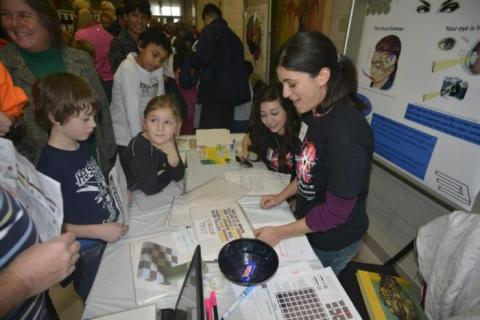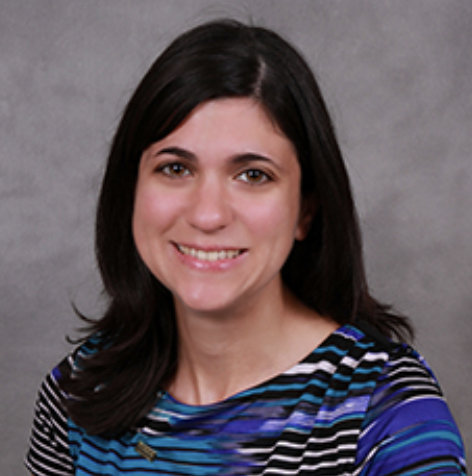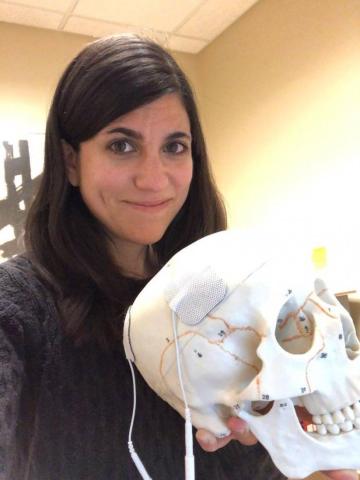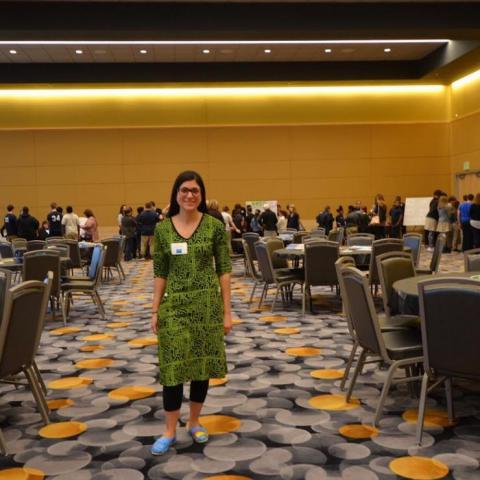From the science of crafting to a science improv show, Georgia Tech has partnered with the Atlanta Science Festival in filling the month of March with science outreach events since the annual festival was founded in 2014. And after receiving a seed grant from the Dana Foundation for the second year in a row, Christina Ragan is ready to partner with the festival to host her outreach “Super Bowl” — Brain Awareness Day.
With a passion for inspiring others and making neuroscience more accessible, Ragan, a faculty member and lecturer in the School of Biological Sciences and the director of Outreach for the Undergraduate Program in Neuroscience at Tech, is a leader in developing neuroscience-related outreach events.
For the past two years, Ragan has been annually awarded a $1,500 seed grant from the Dana Foundation to design that kind of outreach in celebration of Brain Awareness Week, the Foundation’s global campaign dedicated to fostering curiosity and enthusiasm for brain science.
Arriving at Georgia Tech in early 2021, Ragan organized a virtual Brain Awareness Day event for middle school students that welcomed over 100 attendees.
Everyone is Welcome: Science & Engineering Day at GT 2022
This spring’s programming, scheduled on campus for March 19 as part of Science & Engineering Day at GT, is set have an even bigger audience. (Organizers have confirmed that anyone who missed the RSVP period for this day-long celebration is still welcome to attend without registration, with limited courtesy parking available in the central lot shown here.)
As the 2020 Carol Ann Paul Neuroscience Educator of the Year, Ragan’s dedication in the space has already made an impact on campus. This month, we spoke with Ragan to learn more about Brain Awareness Day and her approach to reaching community members beyond campus:
Q: What is Brain Awareness Week, and why do you think it’s important?
A: Brain Awareness Week, organized by the Dana Foundation, is a great way to share Neuroscience to the public in a way that is engaging, fun, and accessible to a broad audience. We are celebrating Brain Awareness Week in three ways: 1. Our Brain Awareness Day event as part of the Atlanta Science Festival (March 19 from 10am-2pm in CULC 483 and 487), 2. Laboratory Tours for High Schoolers during the March 19 event, and 3. Visiting the Drew School on April 1. My organizing committee of Neuro undergraduates (Rommi Kashlan, Brenna Cheney, Claire Deng, and Payton McClarity-Jones) have been extremely helpful in planning these activities.
I love that we get to involve our undergraduates for our outreach events, so they get to teach others all about the brain. I think it's important for the public to learn about the nervous system since it plays such a critical role in pretty much everything we do. Even when we are asleep or daydreaming, our brain is hard at work.
Science doesn't need to be restricted to folks who have formal degrees. Every time a kid asks, "but why?" they are acting just like a scientist!
Q: Seed grants are often given to help researchers or faculty begin to develop new projects or programs. What project or program do you hope to develop with this grant?
A: I would love to get involved with folks involved in STEM education in the greater Atlanta area to assess the outcomes of events like these. Who are we reaching and who do we still need to increase our efforts to? How can we reach the most people? What kinds of events not only promote students to pursue STEM careers, but also encourage appreciation and literacy for science for those who aren't in STEM fields? I'd also like to form strong relationships with area schools so we can share our Neuroscience demonstrations with them, as well.
This is the second year I have received this grant and I am so excited that we can use it to increase the number of resources we can use for Neuroscience outreach. It is a tremendous honor to be recognized for something I consider so rewarding.
I would love it if attendees for our Atlanta Science Festival event walk away excited, inspired, and curious about Neuroscience. I hope that this year's attendees become regular attendees annually and spread the word to their friends. I would love for attendees to tell their parents and teachers about it so we can arrange more school visits, especially to schools who may not always get opportunities
Q: Where does your passion for neuroscience outreach stem from?
A: My mom introduced me to community outreach at a young age through various volunteering opportunities. She instilled an appreciation, rather than an obligation, for serving others and I have her to thank for promoting that. I always had fun volunteering, especially as a family, and never found it to be a chore.
It wasn’t until graduate school when I became involved in Graduate Women in Science that I started doing STEM outreach. During my Postdoctoral Fellowship at Michigan State University, I was involved with the Neuroscience Fair and school visits for Brain Awareness Week. At Purdue University Northwest, I organized my very own Neuroscience Fair event that hosted 500 attendees.
Q: What’s your favorite neuroscience outreach event or program that you’ve done?
A: I call Brain Awareness Day (the event that will be part of Atlanta Science Festival this year) my “Super Bowl”. I love seeing all the attendees engaged with the presenters and the look on their faces when they learn the neuroscience behind the activity. It's really funny when their minds are just blown away after the gears start turning and they figure something out.
Q: Why do you think this kind of outreach is important?
A: Neuroscience outreach is important, especially for middle school girls, because that is the time in their lives when they are unfortunately taught that being smart or liking science isn't for girls. I don't expect everyone who attends our outreach events to become scientists, but I do aim to encourage an appreciation for science and to think like scientists.
We are truly in the Information Age, and it is our job as educators to help students learn how to evaluate all this information that is literally at their fingertips.
Q: How do you envision outreach playing into the future of Georgia Tech’s Neuroscience program as it continues to develop?
A: I think outreach can have a positive impact for our Tech students and for the community. I envision outreach being something that our program is known for to provide our students an opportunity to engage with the public in a way that is fun and an application of what they have learned in their classes.
I think that what we offer students in the classroom is just a small portion of their education. I would love to foster relationships with other schools and youth organizations to make neuroscience accessible to all.





